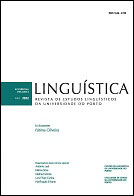The pragmatics of dogwhistles: some questions
Abstract
Os dogwhistles são mecanismos comunicativos de expressão de significados subliminares. Neste artigo, assumo a distinção, usual na literatura sobre o tema, entre dois tipos de dogwhistle: os explícitos e os implícitos, sendo que nestes últimos, ao contrário dos primeiros, a preservação do carácter subliminar da mensagem parece ser uma condição necessária de sucesso comunicativo do dogwhistle. Explorando vários aspectos desta distinção, argumento que, no entanto, os dogwhistles de ambos os tipos se deixam analisar como implicaturas conversacionais, em particular tendo em conta as propriedades canónicas da cancelabilidade e da calculabilidade.
References
Camp, E. (2018). Insinuation, Common Gound, and the Conversational Record. In D. Fogal, D. Harris & M. Moss (Eds.), New Works on Speech Acts (pp. 40-66). Oxford University Press.
Frankfurt. H. (2005). On Bullshit. Princeton University Press.
Garcia-Carpintero. M. (2001). Gricean rational reconstructions and the semantics/pragmatics distinction, Synthese, 128(1), 93-131.
Grice, P. (1989). Studies in the Way of Words. Harvard University Press.
Langton, R. (2012). Beyond Belief: Pragmatics in Hate Speech and Pornography. In I. Maitra, & M. K. McGowan (Eds.), Speech and Harm: Controversies over free speech (pp. 72-93). Oxford University Press.
Levinson, S. (2000). Presumptive Meanings: The Theory of Generalized Conversational Implicature. MIT Press.
Lopez, I. (2014). Dog Whistle Politics: How Coded Racial Appeals Have Reinvented Racism and Wrecked the Middle Class. Oxford University Press.
Mendelberg, T. (2001). The Race Card: Campaign Strategy, Implicit Messages, and the Norm of Equality. Princeton University Press.
Potts, C. (2005). The Logic of Conventional Implicatures. Oxford University Press.
Potts, C. (2007). Into the conventional-implicature dimension. Philosophy Compass, 4(2), 665–679.
Potts, C. (2015). Presupposition and Implicature. In S. Lappin, & C. Fox (Eds.), The Handbook of Contemporary Semantic Theory (pp. 168-202). Oxford University Press.
Saul, J. (2012). Lying, Misleading and What is Said. Oxford University Press.
Saul, J. (2018). Dogwhistles, Political Manipulation and Philosophy of Language. In D. Fogal, D. Harris, & M. Moss (Eds.), New Works on Speech Acts (pp. 360-383). Oxford University Press.
Stanley, J. (2015). How Propaganda Works. Princeton University Press.
Stokke, A. (2016). Lying and Misleading in Discourse. Philosophical Review, 125(1), 83-134.
Tesler, M., & Sears, D. O. (2010). Obama’s Race: The 2008 Election and the Dream of a Post-Racial America. University of Chicago Press.
Tirrell, L. (2012). Genocidal Language Games. In I. Maitra, & M. K. and McGowan, (Eds.), Speech and Harm: Controversies Over Free Speech (pp. 174-221). Oxford University Press.
Torices, J.L. (2021). Undestanding Dogwhistle Politics. Theoria, 36(3), 321-339.
Downloads
Published
Issue
Section
License
Copyright (c) 2022 Linguística: Revista de Estudos Linguísticos da Universidade do Porto

This work is licensed under a Creative Commons Attribution-NonCommercial 4.0 International License.



